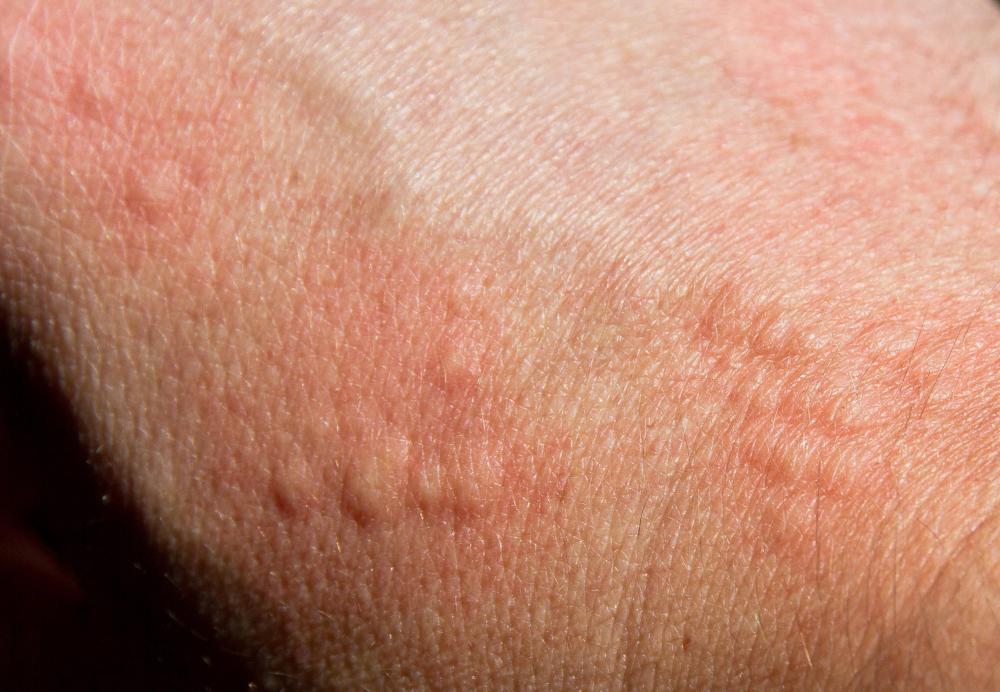At WiseGEEK, we're committed to delivering accurate, trustworthy information. Our expert-authored content is rigorously fact-checked and sourced from credible authorities. Discover how we uphold the highest standards in providing you with reliable knowledge.
What is a Sun Allergy?
A sun allergy is a condition in which someone's skin reacts to sunlight, developing redness, itching, and hives as a result of sun exposure. There are several different types of sun allergy, and sometimes a sun allergy can be a symptom of an underlying medical problem, so it is a good idea to seek medical advice for sun allergy symptoms or any other dermatological problem. For people with sun allergies, there are several different treatment options to consider, depending on the cause of the allergy.
The signs of a sun allergy look a lot like a sunburn, except that skin irritation in reaction to sunlight, known as photodermatosis, emerges within minutes of sun exposure, rather than developing after hours of exposure. The patient may feel itchy or tingly, and the area of skin exposed to the sun turns red and bumpy. Sometimes, a sun allergy may emerge under lightweight clothing as well. The area of irritation usually returns to normal within a day, unlike a sunburn, which can take days or weeks to heal.

When photodermatosis appears, there are several potential causes, including polymorphous light eruption, actinic prurigo, and solar urticaria. These reactions are usually caused by a confused immune system which reacts to compounds in sun-exposed skin. Several proteins change structure when they are exposed to sunlight, making them potential targets of the immune system. It is also possible to develop what is known as a photoallergic eruption in response to the use of medications which increase sun sensitivity, causing rashes, hives, and redness on sun-exposed skin.

A doctor usually diagnoses a sun allergy by exposing skin to wavelengths commonly found in sunlight. If the patient reacts, additional testing may be conducted to determine the cause. Sometimes, a sun allergy can be resolved with desensitization therapy, in which a dermatologist carefully exposes the patient for set periods of time. Antihistamines and topical creams may also be used to treat the symptoms of a sun allergy, and to reduce the severity of future outbreaks.

Some conditions like porphyria can also cause what looks like a sun allergy, which is why it is important to seek medical care. In rare cases, people have developed very aggressive immune responses to sunlight, resulting in anaphylactic shock after sun exposure, which is another critical reason to seek medical attention for a suspected sun allergy.
AS FEATURED ON:
AS FEATURED ON:















Discussion Comments
My aunt was recently told she has a sun allergy called PMLE, which is often a hereditary form of sun allergies. She has been taking beta carotene capsules to help her with this.
She does not know anyone in her family who has been diagnosed with this before. When she is outside in direct sunlight for more than a few minutes she gets a red, itchy rash on her body. She said she doesn't know if the beta carotene is really doing any good, but figures it can't really be hurting her.
She also avoids being outside for very long and usually wears long sleeves and makes sure most of her skin is not directly exposed to the sun.
I have read about people being allergic to the sun before, but until a few months ago had never personally known anyone. My sister found out that my niece as a sun allergy. This can be quite hard to explain to a young one why they have to be so careful when they go outside in the sun.
Her allergy is not as severe as others I have read about, but she must not be in direct sunlight for very long and always have protection on.
Post your comments